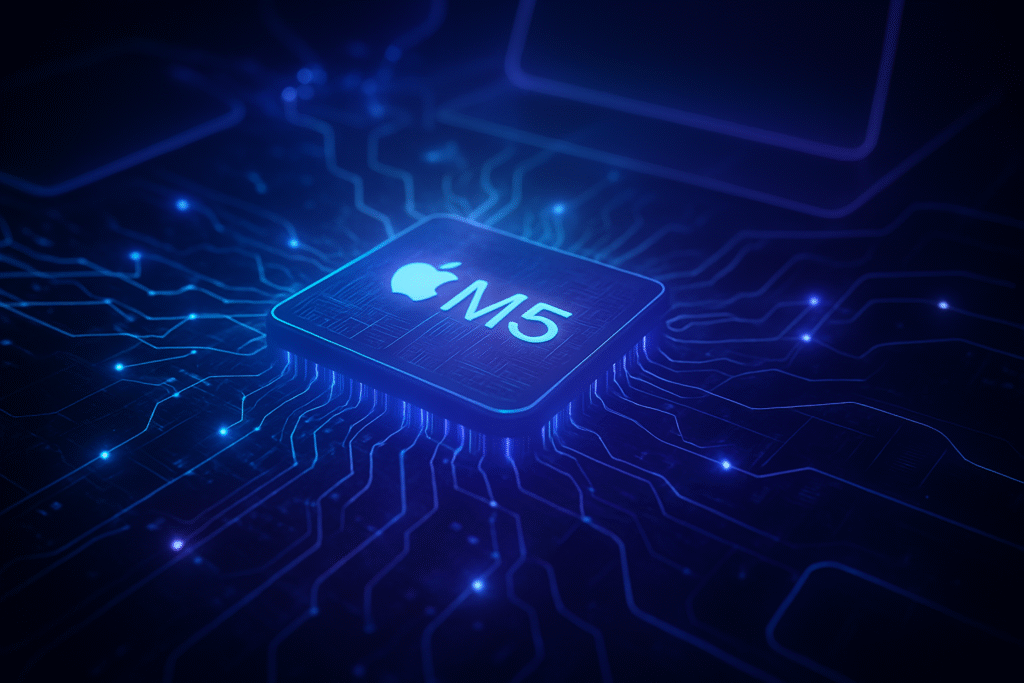Financial News
Apple’s M5 Chip Ushers in a New Era for On-Device AI on MacBooks and iPad Pros

Cupertino, CA – October 15, 2025 – In a landmark announcement poised to redefine the landscape of personal computing and artificial intelligence, Apple (NASDAQ: AAPL) today unveiled its latest generation of MacBook Pro and iPad Pro models, powered by the groundbreaking M5 chip. This new silicon, featuring unprecedented advancements in AI processing, marks a significant leap forward for on-device AI capabilities, promising users faster, more private, and more powerful intelligent experiences directly from their devices. The immediate significance of the M5 lies in its ability to supercharge Apple Intelligence features and enable complex AI workflows locally, moving the frontier of AI from the cloud firmly onto consumer hardware.
The M5 Chip: A Technical Deep Dive into Apple's AI Powerhouse
The M5 chip, meticulously engineered on a third-generation 3-nanometer process, represents a monumental stride in processor design, particularly concerning artificial intelligence. At its core, the M5 boasts a redesigned 10-core GPU architecture, now uniquely integrating a dedicated Neural Accelerator within each core. This innovative integration dramatically accelerates GPU-based AI workloads, achieving over four times the peak GPU compute performance for AI compared to its predecessor, the M4 chip, and an astonishing six-fold increase over the M1 chip. Complementing this is an enhanced 16-core Neural Engine, Apple's specialized hardware for AI acceleration, which significantly boosts performance across a spectrum of AI tasks. While the M4's Neural Engine delivered 38 trillion operations per second (TOPS), the M5's improved engine pushes these capabilities even further, enabling more complex and demanding AI models to run with unprecedented fluidity.
Further enhancing its AI prowess, the M5 chip features a substantial increase in unified memory bandwidth, now reaching 153GB/s—a nearly 30 percent increase over the M4 chip's 120GB/s. This elevated bandwidth is critical for efficiently handling larger and more intricate AI models directly on the device, with the base M5 chip supporting up to 32GB of unified memory. Beyond these AI-specific enhancements, the M5 integrates an updated 10-core CPU, delivering up to 15% faster multithreaded performance than the M4, and a 10-core GPU that provides up to a 45% increase in graphics performance. These general performance improvements synergistically contribute to more efficient and responsive AI processing, making the M5 a true all-rounder for demanding computational tasks.
The technical specifications of the M5 chip diverge significantly from previous generations by embedding AI acceleration more deeply and broadly across the silicon. Unlike earlier approaches that might have relied more heavily on general-purpose cores or a singular Neural Engine, the M5's integration of Neural Accelerators within each GPU core signifies a paradigm shift towards ubiquitous AI processing. This architectural choice not only boosts raw AI performance but also allows for greater parallelization of AI tasks, making applications like diffusion models in Draw Things or large language models in webAI run with remarkable speed. Initial reactions from the AI research community highlight the M5 as a pivotal moment, demonstrating Apple's commitment to pushing the boundaries of what's possible with on-device AI, particularly concerning privacy-preserving local execution of advanced models.
Reshaping the AI Industry: Implications for Companies and Competitive Dynamics
The introduction of Apple's M5 chip is set to send ripples across the AI industry, fundamentally altering the competitive landscape for tech giants, AI labs, and startups alike. Companies heavily invested in on-device AI, particularly those developing applications for image generation, natural language processing, and advanced video analytics, stand to benefit immensely. Developers utilizing Apple's Foundation Models framework will find a significantly more powerful platform for their innovations, enabling them to deploy more sophisticated and responsive AI features directly to users. This development empowers a new generation of AI-driven applications that prioritize privacy and real-time performance, potentially fostering a boom in creative and productivity tools.
The competitive implications for major AI labs and tech companies are profound. While cloud-based AI will continue to thrive for massive training workloads, the M5's capabilities challenge the necessity of constant cloud reliance for inference and fine-tuning on consumer devices. Companies like Google (NASDAQ: GOOGL), Microsoft (NASDAQ: MSFT), and Amazon (NASDAQ: AMZN), which have heavily invested in cloud AI infrastructure, may need to recalibrate their strategies to address the growing demand for powerful local AI processing. Apple's emphasis on on-device AI, coupled with its robust ecosystem, could attract developers who prioritize data privacy and low-latency performance, potentially siphoning talent and innovation away from purely cloud-centric platforms.
Furthermore, the M5 could disrupt existing products and services that currently rely on cloud processing for relatively simple AI tasks. For instance, enhanced on-device capabilities for photo editing, video enhancement, and real-time transcription could reduce subscription costs for cloud-based services or push them to offer more advanced, computationally intensive features. Apple's strategic advantage lies in its vertical integration, allowing it to optimize hardware and software in unison to achieve unparalleled AI performance and efficiency. This market positioning strengthens Apple's hold in the premium device segment and establishes it as a formidable player in the burgeoning AI hardware market, potentially spurring other chip manufacturers to accelerate their own on-device AI initiatives.
The Broader AI Landscape: A Shift Towards Decentralized Intelligence
The M5 chip's debut marks a significant moment in the broader AI landscape, signaling a discernible trend towards decentralized intelligence. For years, the narrative around advanced AI has been dominated by massive cloud data centers and their immense computational power. While these will remain crucial for training foundation models, the M5 demonstrates a powerful shift in where AI inference and application can occur. This move aligns with a growing societal demand for enhanced data privacy and security, as processing tasks are kept local to the user's device, mitigating risks associated with transmitting sensitive information to external servers.
The impacts of this shift are multifaceted. On one hand, it democratizes access to powerful AI, making sophisticated tools available to a wider audience without the need for constant internet connectivity or concerns about data sovereignty. On the other hand, it raises new considerations regarding power consumption, thermal management, and the overall carbon footprint of increasingly powerful consumer devices, even with Apple's efficiency claims. Compared to previous AI milestones, such as the initial breakthroughs in deep learning or the widespread adoption of cloud AI services, the M5 represents a milestone in accessibility and privacy for advanced AI. It's not just about what AI can do, but where and how it can do it, prioritizing the user's direct control and data security.
This development fits perfectly into the ongoing evolution of AI, where the focus is broadening from pure computational power to intelligent integration into daily life. The M5 chip allows for seamless, real-time AI experiences that feel less like interacting with a remote server and more like an inherent capability of the device itself. This could accelerate the development of personalized AI agents, more intuitive user interfaces, and entirely new categories of applications that leverage the full potential of local intelligence. While concerns about the ethical implications of powerful AI persist, Apple's on-device approach offers a partial answer by giving users greater control over their data and AI interactions.
The Horizon of AI: Future Developments and Expert Predictions
The launch of the M5 chip is not merely an end in itself but a significant waypoint on Apple's long-term AI roadmap. In the near term, we can expect to see a rapid proliferation of AI-powered applications optimized specifically for the M5's architecture. Developers will likely leverage the enhanced Neural Engine and GPU accelerators to bring more sophisticated features to existing apps and create entirely new categories of software that were previously constrained by hardware limitations. This includes more advanced real-time video processing, hyper-realistic augmented reality experiences, and highly personalized on-device language models that can adapt to individual user preferences with unprecedented accuracy.
Longer term, the M5's foundation sets the stage for even more ambitious AI integrations. Experts predict that future iterations of Apple silicon will continue to push the boundaries of on-device AI, potentially leading to truly autonomous device-level intelligence that can anticipate user needs, manage complex workflows proactively, and interact with the physical world through advanced computer vision and robotics. Potential applications span from intelligent personal assistants that operate entirely offline to sophisticated health monitoring systems capable of real-time diagnostics and personalized interventions.
However, challenges remain. Continued advancements will demand even greater power efficiency to maintain battery life, especially as AI models grow in complexity. The balance between raw computational power and thermal management will be a constant engineering hurdle. Furthermore, ensuring the robustness and ethical alignment of increasingly autonomous on-device AI will be paramount. Experts predict that the next wave of innovation will not only be in raw performance but also in the development of more efficient AI algorithms and specialized hardware-software co-design that can unlock new levels of intelligence while adhering to strict privacy and security standards. The M5 is a clear signal that the future of AI is personal, powerful, and profoundly integrated into our devices.
A Defining Moment for On-Device Intelligence
Apple's M5 chip represents a defining moment in the evolution of artificial intelligence, particularly for its integration into consumer devices. The key takeaways from this launch are clear: Apple is doubling down on on-device AI, prioritizing privacy, speed, and efficiency through a meticulously engineered silicon architecture. The M5's next-generation GPU with integrated Neural Accelerators, enhanced 16-core Neural Engine, and significantly increased unified memory bandwidth collectively deliver a powerful platform for a new era of intelligent applications. This development not only supercharges Apple Intelligence features but also empowers developers to deploy larger, more complex AI models directly on user devices.
The significance of the M5 in AI history cannot be overstated. It marks a pivotal shift from a predominantly cloud-centric AI paradigm to one where powerful, privacy-preserving intelligence resides at the edge. This move has profound implications for the entire tech industry, fostering innovation in on-device AI applications, challenging existing competitive dynamics, and aligning with a broader societal demand for data security. The long-term impact will likely see a proliferation of highly personalized, responsive, and secure AI experiences that seamlessly integrate into our daily lives, transforming how we interact with technology.
In the coming weeks and months, the tech world will be watching closely to see how developers leverage the M5's capabilities. Expect a surge in new AI-powered applications across the MacBook and iPad Pro ecosystems, pushing the boundaries of creativity, productivity, and personal assistance. This launch is not just about a new chip; it's about Apple's vision for the future of AI, a future where intelligence is not just powerful, but also personal and private.
This content is intended for informational purposes only and represents analysis of current AI developments.
TokenRing AI delivers enterprise-grade solutions for multi-agent AI workflow orchestration, AI-powered development tools, and seamless remote collaboration platforms.
For more information, visit https://www.tokenring.ai/.
More News
View More




Quotes delayed at least 20 minutes.
By accessing this page, you agree to the following
Privacy Policy and Terms Of Service.




